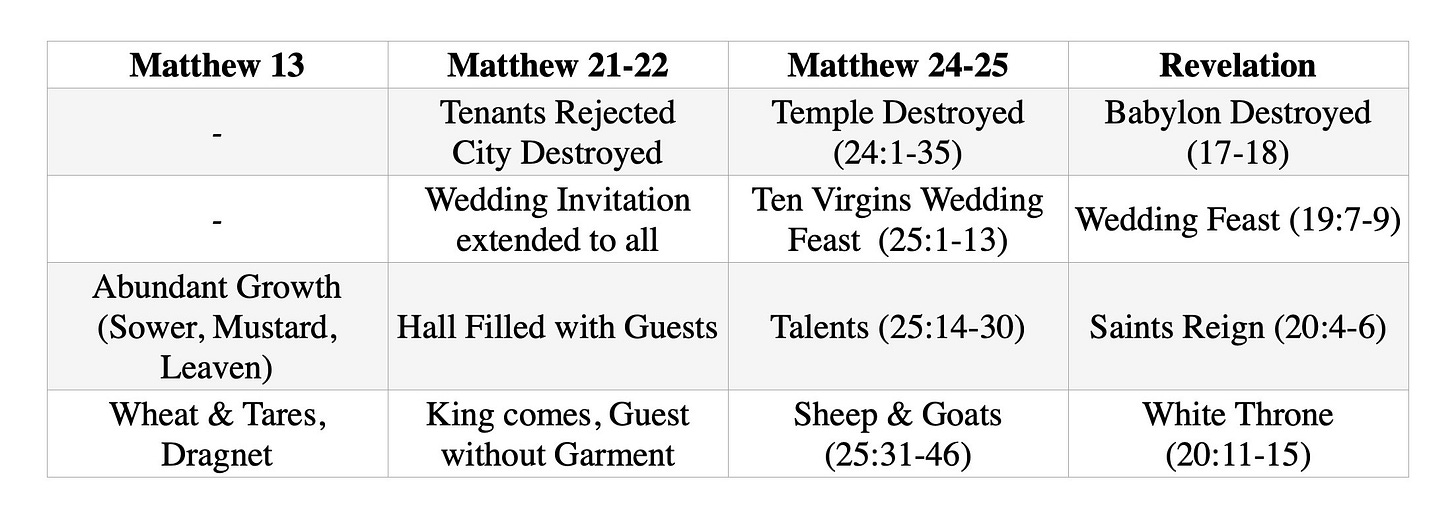The Parables and the Discourse
In reading Jesus’ parables on the kingdom of heaven we have so far noticed two stages. Matthew 13 spoke of it’s abundant growth leading up until harvest while the next group of parables in 18-22 spoke of rejection, judgment, transition, and then fruitfulness and a hall filled with guests. Putting those together we concluded that in the kingdom of heaven we would see a judgment and transition in management leading to faithfulness, fruit, and universal spread. Then when the net is full and the hall is filled with guests the King will come and separate the good from the bad.
So now we come to the last group of parables Jesus gives us in regard to the Kingdom of heaven. We find this group in Matthew 24-25. Preceding these parables we read the disciples question about the timing of the temple’s destruction. In answer Jesus gives a long sermon fill with warnings and signs of his coming within that generation. After this we have three parables or possibly four;
The wicked servant (24:45-51) - The wicked servant receives sudden judgment while the faithful servant is given greater responsibility.
The Ten Virgins (25:1-13) - Wise virgins entering the wedding feast.
The Talents (25:14-30) - Faithful and unfaithful stewardship during the master's long absence.
The Sheep and Goats (25:31-46) - Final separation and judgment at the kings return.
Before getting into things already we should notice that we have seen this progression before in the parables of Matt 21-22. Like the previous set of parables once again we have an extended conversation about judgment at the beginning (Matt 24) and a separation at the end (Matt 25). Granting that many of the passages can be difficult to interpret, has not our Lord greatly prepared us already to understand His meaning?
While Jesus doesn't explicitly call the first parable a 'kingdom' parable, it flows directly into the kingdom parables and shows the same transition theme - unfaithful stewards judged, faithful stewards elevated. Notice the progression: the faithful servant's reward of being 'placed over all the master's possessions' becomes the starting point for the Talents parable, where servants are given responsibility during the master's 'long' absence. Together these parables continue the theme of Matt 21; A judgment and transition leading to fruitful kingdom work.
The second parable continues the theme of the wedding feast from Matt 22. Those who enter the feast are those with oil while those without are rejected. The oil commonly represents the holy spirit while virgins represented the covenant people in the OT. The Jews at that time were truly part of God’s covenant people as were the Christians who received the promised Spirit. Yet this arrangement would not last. At that crucial moment, those who had not received the Spirit were cut off from the feast. The sacrificial system came to an end with the destruction of the temple in AD70. At that time the Christians left the city while the Jews who remained perished in Jerusalem.1
Remembering the parable of the wedding feast in Matt 22 after the judgment we would expect the universal invitation to the feast to be proclaimed and the hall to begin filling with guests; the great growth of Matt 13. The third parable of the talents shows us servants whose faithful work has doubled what they have received. Only one servant was unfaithful and he was separated at the master’s coming.
That brings us to our last parable of the sheep and the goats. Returning to the agricultural images of Matthew 13 (a great harvest, a net filled with fish) a great flock of sheep and goats are separated and meet their eternal destinations.
We can notice a similar flow also in the book of Revelation. After the unfaithful city is destroyed (Rev 17-18) the saints participate in the wedding supper of the lamb (Rev 19) and then rule with Christ for a thousand years which ends with the great white throne judgment (Rev 20).
Understanding Jesus’ words about a judgment in the beginning of His kingdom allows us to read the Olivet discourse and even the book of Revelation differently. Instead of prophecies of an unknown future they may be understood (and certainly seem to imply) to be speaking of a judgment which would happen in the first generation; ‘Truly, I say to you, this generation will not pass away until all these things take place’ (Matt 24:34), ‘The revelation of Jesus Christ, which God gave him to show to his servants the things that must soon take place…’ (Rev 1:10). This judgment would not be the end but a moment of transition to the fruitful period of the New Covenant at the end of which our Lord will return, the harvest will be separated, and the kingdom given back to God the Father (1 Cor 15:24).
We are living in a very significant era of kingdom history - the 'long time' when faithful stewardship produces abundant fruit. This isn't a waiting period; we are called to invite everyone to the feast. Just as Jesus said ‘the city’ was judged and ‘the kingdom’ has been transferred to fruitful servants. Surely the abundant harvest Jesus spoke of in Matthew 13 will be realised. Let us then sow with confidence, fish with hope, and share the invitation to the feast boldly.
The interested reader is pointed to James Jordan commentary on Matthew 23-25 which makes the same point about the parable of the ten virgins in much greater detail.








The best Words in the best last days timing!!